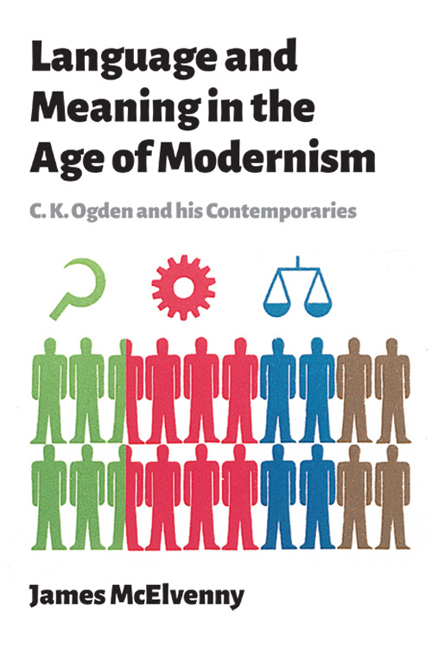Summary
In novels, Utopias, essays, films, pamphlets, the antithesis crops up, always more or less the same. On the one side science, order, progress, internationalism, aeroplanes, steel, concrete, hygiene: on the other side war, nationalism, religion, monarchy, peasants, Greek professors, poets, horses. History as he sees it is a series of victories won by the scientific man over the romantic man. (Orwell 1968 [1941]: 142)
Written during the most hopeless days of the Second World War, this is George Orwell’s (1903–1950) summary of the main themes in the writings of H. G. Wells (1866–1946). The faith in science and technology to effect progress for humanity that Orwell identified in Wells is the same sentiment that drives the efforts recounted in these pages, efforts to tame language, pin it down, bring it under the control of science and engineer it anew for the benefit of humanity. These efforts we explore from the perspective of the English scholar C. K. Ogden (1889–1957) – the C and K stand for ‘Charles’ and ‘Kay’ respectively, but he preferred to be known just as ‘C. K.’ – whose various projects span from the first decade of the twentieth century to the end of the Second World War, years typically identified with the age of modernism.
It is fitting that we open with Wells and Orwell. Not only did both serve, as we will see, as literary interpreters of Ogden’s later work, but they also delineate our age. Each of them stands at one end of the era and of the cultural arc that begins with optimism and ends with disillusionment: Wells at the hopeful beginning and Orwell at the troubled and sober end. This is the arc of the age of modernism. ‘Modernism’, as every text that invokes it must observe, is a nebulous term, conjuring up various fashions and associations. The general character of modernism as a socio-historical category is well known and hardly needs to be rehearsed here. Nevertheless, the very breadth of the category necessitates some explicit attempt to delineate its contours, which are discernible also in the specific ideas and events we recount in this book.
A prominent feature of the age of modernism, and a key aspect for us, is technology. In this period, technology was often praised as the driver of progress, but the unprecedented change it brought was associated with tumult, revolution and the resulting human catastrophes that marred the age.
- Type
- Chapter
- Information
- Language and Meaning in the Age of ModernismC.K. Ogden and His Contemporaries, pp. 1 - 6Publisher: Edinburgh University PressPrint publication year: 2018

